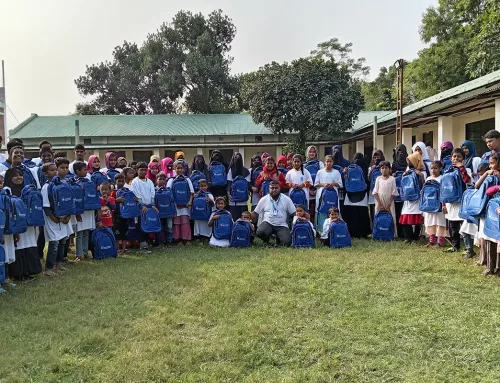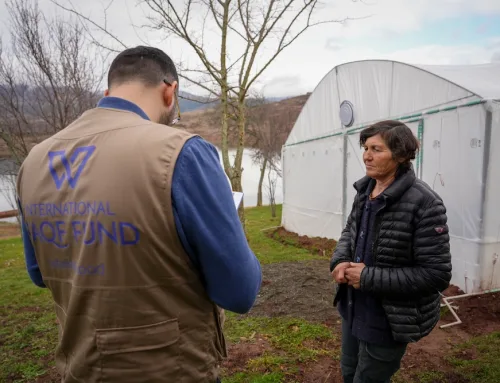About one-third of families in India’s Assam state live below the poverty line. A situation made even more precarious by the widespread annual floods experienced by the state. Life in the underdeveloped district of Goalpara is particularly tough. Thus, local people regularly losing everything to the deluge. In addition to the poor access to even basic services such as health and education.
In 2016, as Islamic Relief delivered a shelter project for constructed safe learning spaces in Goalpara. We came across a makeshift community school. Pekipeki Middle School had been running for two decades from a temporary bamboo shed donated by local people. It was also the only school within ten kilometres serving children – mostly girls – from the Ethnic Bengali speaking Muslim community and other marginalised communities. Lacking even basic facilities like toilets and access to drinking water, the already unsafe structure was badly damaged by monsoon rains and recent flooding.
The following year, Islamic Relief Waqf funded the reconstruction of the school as a part of constructed safe learning spaces project. There are now three classrooms and an administration room for school staff to use. For the first time, the school also has toilets, handwashing points and drinking water facilities. Eager to ensure the school is accessible to all, we also built a ramp for children with reduced mobility.
Some 200 children now have access to safe spaces in which to learn and begin to build brighter futures.
“Future generations will remember this”
the headmaster of Pekpeki Middle School, Shahjul Islam
As the headmaster of Pekpeki Middle School, Shahjul Islam, 37, is determined that the children at his school should have the chance to learn.
“Since 2005, I have been working voluntarily and encouraging parents to send their children to school,” he told us, explaining that poverty drives many families in the area to send their children out to work rather than school. “I strongly believe that only education can change their fate.”
With school fees beyond the means of the families with children attending the school, Shahjul and his team of five teachers are not paid for their services.
“Every year, we had to spend some money to repair our bamboo structure. Often villagers come forward and contribute bamboo or their labour to repair it. The school had neither toilets nor drinking water facilities. Many girl students dropped out due to the lack of sanitation facilities,” added the headteacher.
The impact of the school new building constructed with Waqf funding has therefore been huge, Shahjul said:
“This is beyond our expectations. Now, we have spacious classrooms with basic facilities like electricity, drinking water points, hand washing points, separate toilets for boys and girls. Now we have water points to perform wudu (ritual washing performed in preparation for prayer and worship). We have almost everything.
“We are grateful to Islamic Relief Waqf for this generous and wonderful support. All future generations will remember this.”
Rukiya Begum’s experience with constructed safe learning spaces Project
For Rukiya Begum, 11, studying in the new school building is much easier than it was in the old makeshift structure, which leaked in the summer and let in freezing draughts in the winter.
“Now, I am not going to worry about summers or winters,” the schoolgirl told us. “Once we start classes in the new school, we do not have to worry about missing classes.”
Already, Rukiya and her fellow students have big plans for their new school. Participating in a World Environment Day event, they planted trees near the building and next, Rukiya explained, they want to create a garden.
“I want to make my school green. I will ask all my friends to plant trees and nurture them.”
Thanks to your donations we are able to transform the lives of children like Rukiya.
Donate now to support more life-changing projects like these.





